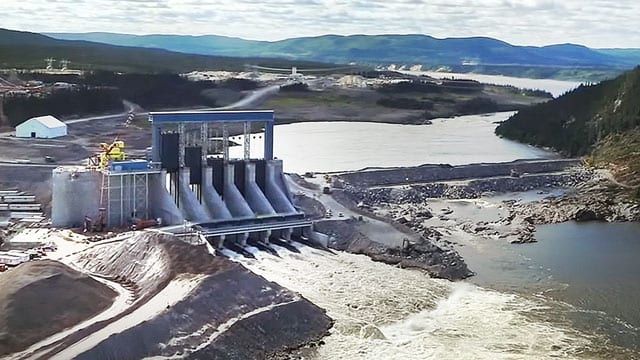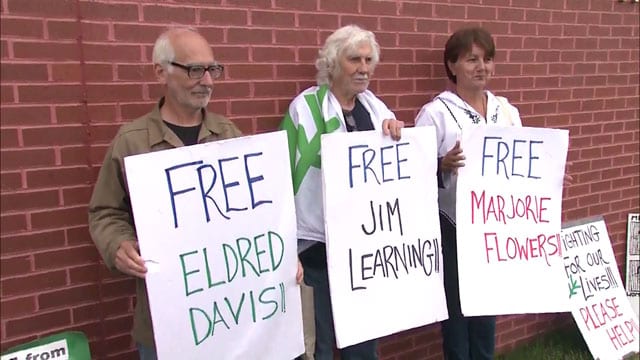
A thousand-page report into the financial and operational issues facing the multi-billion dollar Muskrat Falls hydroelectric project says the province of Newfoundland and Labrador, as well as its Crown corporation Nalcor, “created an environment of mistrust” by failing to allow concerned Indigenous peoples and other citizens to “engage in a meaningful and transparent consultation process.”
The report, written by provincial Supreme Court Justice Richard LeBlanc, was released Mar. 10.
LeBlanc says by not properly consulting people on the ground created a problem of its own.
“This mistrust and suspicion led to protests that caused project delays and significant cost overruns,” LeBlanc wrote. “Even today, GNL has failed to ensure that its commitments, and those of Nalcor, regarding environmental matters related to the project are being properly tracked, monitored and addressed.”
LeBlanc did not have a mandate to look into the environmental factors that concern a number of Indigenous people in Labrador and the dam that sits on the Churchill River less than an hour’s drive west of Goose Bay in central Labrador.
The price tag for the project was $6.2 billion when it was approved in 2012 – but has since ballooned to $12.7 billion.
It now accounts for about a third of the Newfoundland and Labrador’s considerable debt and has been referred to as a “boondoggle” by Nalcor’s current CEO, and the province’s “biggest fiscal mistake” by its current premier.
While the Innu Nation signed off on the project, opposition from Indigenous peoples in the region grew almost as fast as the hydro dam’s budget overruns.
That opposition included a four day occupation of the construction site in a last ditch effort to protect their traditional foods and way of life.
More than a dozen people were charged civilly and criminally for trespassing.
The Crown dropped criminal charges against most of them – but six others still face criminal charges.
Caitlin Urquhart, a St. John’s lawyer who represented them, says the report from Leblanc was “validating” for the land protectors because of what they experienced.
“They took every possible step to try to ensure their concerns were heard and addressed prior to this project going ahead and the fact that the commissioner found that was what in fact happened,” she said. “The government and Nalcor failed to act fairly with Indigenous groups as well as environmental issues and that they created this environment of mistrust and suspicion which is exactly, as I say, is what the individuals, who I represented and their groups, that’s what they experienced was validating.”
Watch the full interview with Caitlin Urhquart.
In February, federal Natural Resources Minister Seamus O’Regan and Premier Dwight Ball announced that their two governments would scrap the financial structure agreed upon in past federal-provincial loan agreements, moving to a model that redirects benefits to ratepayers.
Both politicians called the announcement, which was light on dollar figures, a major milestone in easing residents’ fears that electricity rates will spike sharply when the over-budget dam comes fully online next year.
Details of how the project will meet financing requirements in coming decades to make up the gap in funds are still to be worked out.
Leblanc found that past provincial governments overseeing the troubled Muskrat Falls hydroelectric project failed to protect the residents of Newfoundland and Labrador financially.
The scathing report concluded the government failed its duty to residents by predetermining that the megaproject would proceed no matter what.
“In acting as it did, (the provincial government) failed in its duty to ensure the best interests of the province’s residents were safeguarded,” LeBlanc wrote.
He wrote that politicians also failed residents by placing “blind trust” in executives of Nalcor, the Crown corporation overseeing the hydro dam, who then “exploited this trust by frequently concealing information about the project’s costs, schedule and risks.”
(Eldred Davis, Jim Learning and Marjorie Flowers are three people arrested in association with protests against the Muskrat Falls project. APTN)
Liberal Premier Dwight Ball and Natural Resources Minister Siobhan Coady released the six-volume report, titled “Muskrat Falls: A Misguided Project,” at a news conference Tuesday afternoon in St. John’s.
Ball said the report will now be referred to police and the provincial justice department.
The inquiry led by LeBlanc ran hearings from fall 2018 through last summer looking into cost and schedule overruns of the $12.7-billion dam on Labrador’s Lower Churchill River.
The report was presented to the provincial government last Thursday and reviewed by government lawyers before its public release.
The 824 megawatt hydroelectric dam will eventually send power to Newfoundland and later Nova Scotia through subsea cables.
It’s set to produce more power than the province needs and its financial structure, which Ottawa has agreed to reconfigure, would leave electricity ratepayers to pay for the extra costs through their monthly bills.
In his report, LeBlanc concluded that the business case, which assumed the Muskrat Falls project was the lowest-cost power option for residents, was “questionable.” He wrote that the project’s economics were not sufficiently tested and that Nalcor failed to consider all potentially viable power options.
LeBlanc laid significant blame at the feet of former Nalcor CEO Ed Martin, naming him and other executives as taking “unprincipled steps to help secure project sanction,” including concealing information that could undermine the business case to the public and government.
These actions included “deliberately” not obtaining a risk report prepared by consulting firm SNC-Lavalin in 2013 which added a possible $2.4 billion to Nalcor’s risk calculations, though LeBlanc wrote “it is clear that Nalcor knew of its existence.”
(Land protectors inside the Nalcor offices in 2016)
LeBlanc wrote that Martin fostered a culture of superiority within the project’s inexperienced senior management team, which regularly ignored the advice of more knowledgeable individuals, and that executives took advantage of government officials’ lack of knowledge about hydro projects.
He wrote that there is “no doubt” Martin in particular “must be faulted for intentionally failing to disclose … relevant information on costs, schedule, and risk” and that the government itself must be faulted for failing to apply proper oversight.
He also wrote that government and Nalcor officials failed to research well-known risks related to megaproject cost and schedule runs, writing that “their failure to do this is indefensible.”
Leblanc also critiqued the government for commissioning a report by Manitoba Hydro International that was “plainly and obviously improperly influenced and biased in favour of the project.” He called the report and the government’s involvement in restricting its scope a missed opportunity for comprehensive analysis ahead of sanctioning the project.
LeBlanc made 17 recommendations that included limiting the powers of Nalcor related to withholding information from government on legal or commercial grounds.
He also recommended the government should not undertake any project with a budget larger than $50 million without engaging with independent experts and providing “well-defined” oversight.
Other recommendations involved taking steps to ensure civil servants “are empowered to speak truth to politicians” and enacting “duty to document” legislation applying to government, Crown corporations and agencies within six months.
Lingering over Labrador is phase two of the Lower Churchill hydroelectric project.
The Gull Island project is a massive dam that, if completed, will produce 2,250 megawatts of power, compared to Muskrat Falls’ 824.
“I think most of them are hopeful that that project will not go ahead,” said Urquhart. “That was part of the same environmental assessment, the two projects were assessed together… and I think we’re sort of seeing across the country that these projects need to have true, robust, consultations, meaningful consultation, consent from Indigenous communities – It has to be more than just checking boxes.
In terms of Muskrat Falls, Nalcor said the project is 99 per cent complete and is expected to supply power by the end of 2020.
“People still have to live with the consequences of this project,” said Urquhart.












